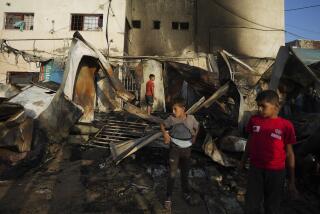U.S. Gives N. Korea Provisos on Food Aid
WASHINGTON — The United States is imposing restrictions on food aid to North Korea for the first time since deliveries began during the famine that struck the country in the mid-1990s.
The announcement Friday came two months after North Korea informed the United States that it was developing uranium-based nuclear weapons, despite a 1994 U.S.-North Korean agreement that it would halt atomic arms programs.
Administration officials insisted that the North Korean disclosure did not influence the decision to impose conditions on food deliveries.
The United States has been the largest food donor to North Korea this year, delivering 170,000 tons.
State Department spokeswoman Jo-Anne Prokopowicz said the United States has informed North Korea that any additional food aid this year will depend on its improving access by international monitors to areas where donated food is delivered.
She said the North had not responded to the U.S. request. She added that the United States would consider a World Food Program appeal for food donations in 2003 based on the availability of U.S. food stocks, need, competing needs elsewhere and ability to monitor distribution.
Administration officials said a major U.S. concern is the lack of access by World Food Program monitors to large swaths of North Korean territory. This prevents monitors from ensuring that the assistance is delivered to the intended recipients.
The officials, who asked not to be identified, said nongovernmental organizations based in Pyongyang, the capital, have become increasingly disillusioned with the restrictions they face.
Some have left the country. Others complain that the North Koreans have charged them tens of thousands of dollars to set up offices, the officials said.
They added that the North’s food needs remain substantial but are about half what they were during the famine of the 1990s.
Other donors, including Japan, are cutting back on food assistance to North Korea. Japan is seeking concessions from North Korea in its conflict with Pyongyang over Japanese citizens kidnapped decades ago.
Rick Corsino, WFP country director for North Korea, said this week that there has been a sharp drop-off in food donations since September.
He said the WFP is urging the international community to contribute $201 million in food deliveries to North Korea in 2003.
More to Read
Sign up for Essential California
The most important California stories and recommendations in your inbox every morning.
You may occasionally receive promotional content from the Los Angeles Times.










